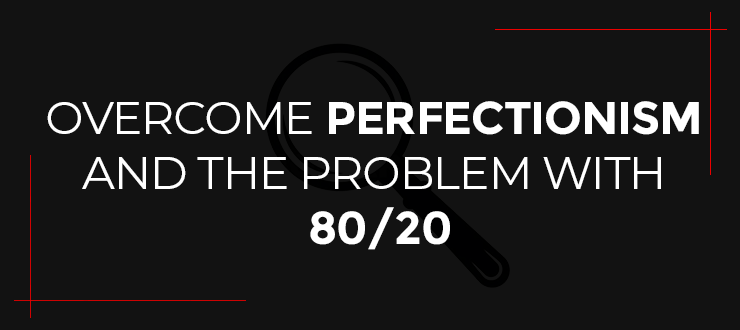I struggle with perfectionism. I take the extra step even when it's probably not going to make much of a difference to the bottom line.
Yes, I've heard about 80/20, fully understand it and more importantly agree with the logic behind it.
But for some reason I can't action it.
I used to tell myself that it's because I have high standards, but the truth is that I don't always have the confidence that doing just 80% will be good enough.
The problem with 80/20 thinking is that it's so vague. What is the 80/20 mark? Where is it? How will I know I've hit it? What is good enough?
Because of that ambiguity my emotions end up overriding my logic I end up overcompensating and going far beyond the 80/20 mark.
Why?
Because that gives me 100% emotional assurance.
I've grown to accept that a need for emotional assurance will trump logic. I see this all the time in myself and in my clients.
99% of the time, the best thing to do is to get down to the core of the issue, uproot it and resolve it for good.
However in some rare cases there are tactics or workarounds that can do wonders... and I just found a massive one.
Since emotions tend to run haywire whenever there is uncertainty or ambiguity, what if I could just remove the ambiguity?
What if I just changed the language around this and instead of asking:
"What's the 80/20 here?"
I asked:
"What's the Minimum Effective Dose needed to get the desired outcome I want from this project?"
By asking that simple question I can clearly see what needs to be done to get the outcome I want and what doesn't.
In order to do this I ask myself:
- What is the desired outcome I want from this project?
- What would be the the Minimum Effective Dose (ie the bare minimum) that needs to be done in order for just that to happen?
- So what is the Minimum Effective Dose of work I need to do that will allow me to achieve the outcome I want?
Asking these questions makes understanding what is a must (the 80%) and what is a "nice to have" (the 20%) so clear and obvious that I buy into it and don't go overboard.
For example, the desired result I wanted from this article was to:
- Get people who read my blog to say "Wow, that's another really insightful thing from Itamar. I'm glad I read his articles."
- Gain more social equity that will get people to apply to one of my programs next time I have an opening.
After establishing my desired outcome and figuring out the Minimum Effective Dose I gave myself permission to write this email in 20 minutes instead of the usual 2 hours.
And more importantly, I feel 100% at peace with it knowing it would be good enough.
I know I achieved my goal and I didn't go overboard in the process.
All thanks to one simple question
"What's the Minimum Effective Dose?"
How You Can Apply This
Next time you're fumbling around and find yourself tinkering with things that logically you know you shouldn't be take a step back and ask yourself:
- What is the desired outcome I want from this project?
- What would be the the Minimum Effective Dose (ie the bare minimum) that needs to be done in order for just that to happen?
- So what is the Minimum Effective Dose of work I need to do that will allow me to achieve the outcome I want?
Then watch your brain suddenly let go of that unnecessary and detrimental perfectionism.
P.S.
If you found this article helpful please share it with a friend or team member you think could benefit from it (or share it on social).

